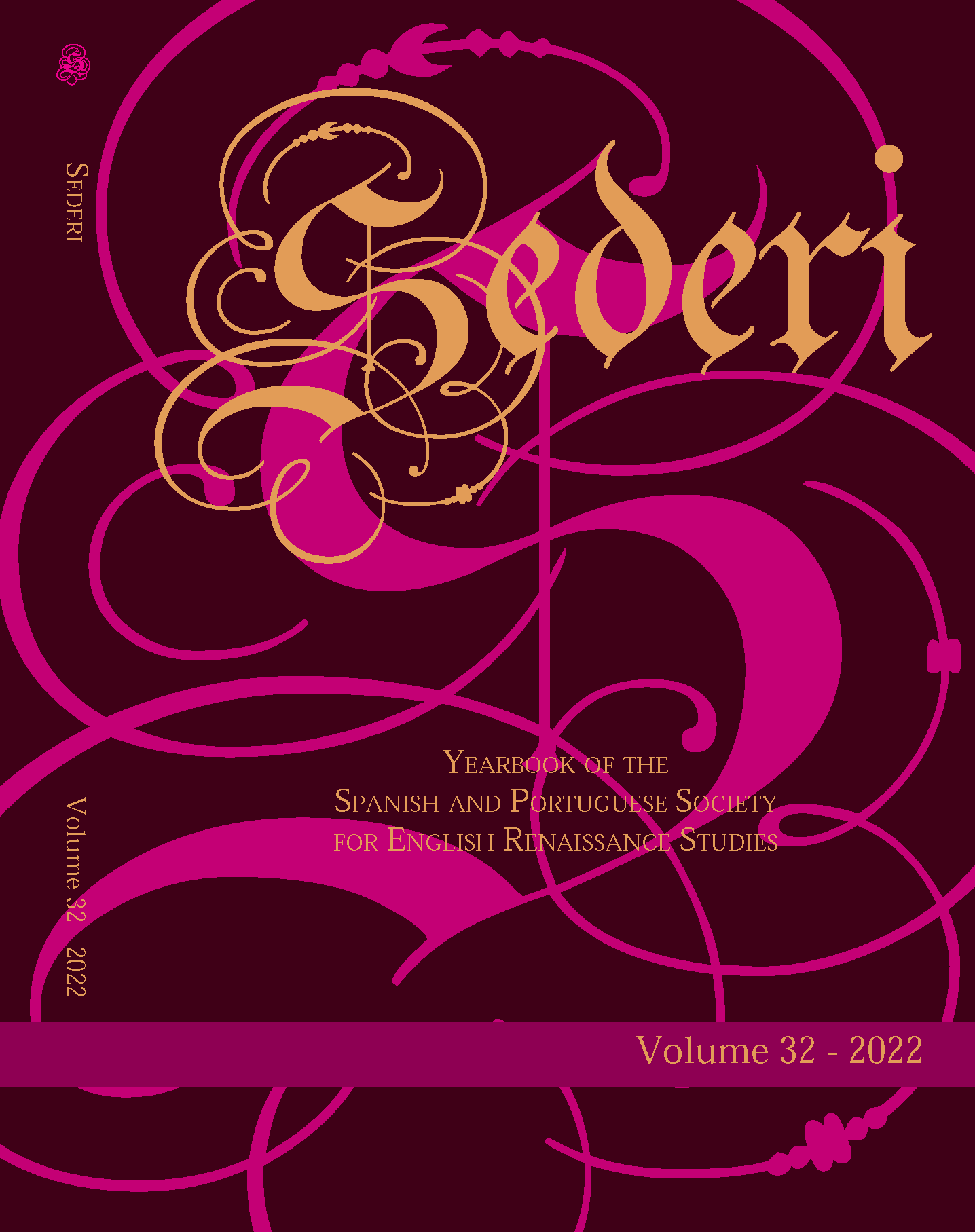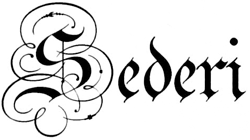
Sederi 32
Sederi 32 — 2022
EDITOR
Marta Cerezo Moreno
MANAGING EDITOR
Isabel Guerrero Llorente
REVIEW EDITOR
Miguel Ramalhete
ISSN 1135-7789
Cristina Paravano, “’Remembrance of things past’: Classical and Renaissance echoes in Philip Massinger’s The Roman Actor.” SEDERI 32 (2022): 87‒110
DOI: https://doi.org/10.34136/sederi.2022.4 Download PDF
Abstract
This essay discusses Philip Massinger’s The Roman Actor (1626) as an example of the profoundly composite nature of early modern dramatic texts. Massinger placed borrowings and echoes from several classical and early modern texts in a new context, arguably counting on audiences’ pleasure of recognition. Focusing on sources which have not received enough critical attention, this essay investigates the influence of classical authors like Tacitus and Statius, and the impact of other Massingerian plays to shed light on the way the playwright appropriated and refashioned some sources to suit his tragedy’s political agenda.
Keywords: The Roman Actor; Massinger; audience; sources; refashioning.
References
Primary sources
Edwards and Gibson 1976a. See Massinger 1976a.
Edwards and Gibson 1976b. See Massinger 1976b.
Fletcher, John, and Philip Massinger. (1622) 1994. The Double Marriage, edited by Cyrus Hoy. In The Dramatic Works in the Beaumont and Fletcher Canon, general editor Fredson Bowers, vol.9, 105−220. Cambridge: Cambridge University Press.
Hoy 1994. See Fletcher and Massinger 1994.
Jonson, Ben. (1603) 2012. Sejanus, edited by Tom Cain. In The Cambridge Edition of the Works of Ben Jonson, edited by David Bevington, Martin Butler, and Ian Donaldson, 7 vols., vol. 2, 212−391. Cambridge: Cambridge University Press.
“Loeb Classical Library.” Harvard University Press. Accessed 23 July 2022. https://www.loebclassics.com/.
Massinger, Philip. (1626) 1976a. The Roman Actor. In The Plays and Poems of Philip Massinger. Vol. 3, edited by Philip Edwards and Colin A. Gibson, 13−98. Oxford: Clarendon Press.
Massinger, Philip. (1622–1625) 1976b. The Maid of Honour. In The Plays and Poems of Philip Massinger. Vol. 1, edited by Philip Edwards and Colin A. Gibson, 117−198. Oxford: Clarendon Press.
Massinger, Philip. (1626) 2007. The Roman Actor, edited by Martin White. Revels Plays. Manchester: Manchester University Press.
Shakespeare, William. (1600) 2005. Hamlet. In The Oxford Shakespeare: The Complete Works, edited by Stanley Wells, Gary Taylor, John Jowett, and William Montgomery, 681−718. Oxford: Clarendon Press.
Statius. 2015. Silvae, edited and translated by D. R. Shackleton Bailey; with corrections by Christopher A. Parrott. Cambridge, MA and London: Cambridge University Press.
Tacitus. 1999. Agricola and Germany, edited by Anthony R. Birley. Oxford: Oxford University Press.
Tacitus. 2017. The Annals of Tacitus, edited by A. J. Woodman. Vol. 2. Cambridge: Cambridge University Press.
White 2007. See Massinger 2007.
Secondary sources
Bailey, Rebecca. 2009. Staging the Old Faith: Queen Henrietta Maria and the Theatre of Caroline England, 1625–1642. Manchester: Manchester University Press.
Beal, Peter. 1980. “Massinger at Bay: Unpublished Verses in a War of the Theatres.” The Yearbook of English Studies 10: 190−203.
Belsey, Catherine. 2015. “The Elephants’ Graveyard Revisited: Shakespeare at Work in Antony and Cleopatra, Romeo and Juliet and All’s Well That Ends Well.” Shakespeare Survey 68: 62−72.
Bentley, Gerald Eades. 1946. The Jacobean and Caroline Stage. Vol. 4. Oxford: Oxford University Press.
Briggs, William D. 1912. “The Influence of Jonson’s Tragedy on the Seventeenth Century.” Anglia 35: 277−337.
Britland, Karen. 2006. Drama at the Courts of Queen Henrietta Maria. Cambridge: Cambridge University Press.
Britton, Dennis Austin, and Melissa Walter, eds. 2018. Rethinking Shakespeare Source Study: Audience, Authors, and Digital Technologies. London and New York: Routledge.
Bruster, Douglas. 2000. Quoting Shakespeare: Form and Culture in Early Modern Drama. Lincoln, NB: The University of Nebraska Press.
Burrow, Colin. 2019. Imitating Authors: Plato to Futurity. Oxford: Oxford University Press.
Butler, Martin. 1984. Theatre and Crisis. 1632–42. Cambridge: Cambridge University Press.
Butler, Martin. 1985. “The Roman Actor and the Early Stuart Classical Play.” In Philip Massinger: A Critical Reassessment, edited by Douglas Howard, 139–170. Cambridge: Cambridge University Press.
Carlson, Marvin. 2011. The Haunted Stage. The Theatre as Memory Machine. Ann Arbor: The University of Michigan Press.
Clark, Sandra. 1994. The Plays of Beaumont and Fletcher. London and New York: Routledge.
Curran, John E., Jr. 2009. “Fletcher, Massinger, and Roman Imperial Character.” Comparative Drama 43: 317–354.
Cust, Richard. 1987. The Forced Loan and English Politics 1626−8. Oxford: Clarendon Press.
Dunn, T. A. 1957. Philip Massinger: The Man and the Playwright. Edinburgh: Nelson & Sons.
Dunnum, Eric. 2012. “‘Not to Be Altered’: Performance’s Efficacy and Audience Reaction in The Roman Actor.” Comparative Drama 46: 517–543.
Dustagheer, Sarah. 2017. Shakespeare’s Two Playhouses: Repertory and Theatre Space at the Globe and the Blackfriars 1599–1613. Cambridge: Cambridge University Press.
Gajda, Alexandra. 2010. “Tacitus and Political Thought in Early Modern Europe, c. 1530 – c. 1640.” In The Cambridge Companion to Tacitus, edited by A. J. Woodman, 253−268. Cambridge: Cambridge University Press.
Gibson, Colin A. 1961. “Massinger’s Use of His Sources for The Roman Actor.” AUMLA 15, no.1: 60–72.
Glapthorne, Henry. 1874. The Plays and Poems of Henry Glapthorne. Vol. 2. London: John Pearson.
Goldberg, Jonathan. 1983. James I and the Politics of Literature: Jonson, Shakespeare, Donne, and Their Contemporaries. Baltimore: Johns Hopkins University Press.
Greenberg, Marissa. 2011. “The Tyranny of Tragedy: Catharsis in England and The Roman Actor.” Renaissance Drama 39: 163–196.
Gurr, Andrew. 2004. The Shakespeare Company. 1594–1642. Cambridge: Cambridge University Press.
Gurr, Andrew, and Farah Karim-Cooper, eds. 2014. Moving Shakespeare Indoors. Performance and Repertoire in the Jacobean Playhouse. Cambridge: Cambridge University Press.
Guy-Bray, Stephen. 2013. “Sources.” In Early Modern Theatricality, edited by Henry S. Turner, 133−150. Oxford: Oxford University Press.
Hartley, Andrew James. 2001. “Philip Massinger’s The Roman Actor and the Semiotics of Censored Theater.” English Literary History 68: 359–376.
Hogan, A. P. 1971. “Imagery of Acting in The Roman Actor.” MLR 61: 273−281.
Hoy, Cyrus. 1957. “The Shares of Fletcher and His Collaborators in the Beaumont and Fletcher Canon (II).” Studies in Bibliography 9: 143−162.
Hoy, Cyrus. 1985. “Massinger as Collaborator: The Plays with Fletcher and Others.” In Philip Massinger: A Critical Reassessment, edited by Douglas Howard, 51–82. Cambridge: Cambridge University Press.
Huebert, Robert, and David McNeill, eds. 2019 Early Modern Spectatorship: Interpreting English Culture, 1500-1780. Montreal: McGill-Queen’s University Press.
Jones, Brian W. 1992. The Emperor Domitian. London: Routledge.
Kewes, Paulina. 2011. “Henry Savile’s Tacitus and the Politics of Roman History in Late Elizabethan England.” Huntington Library Quarterly 74, no.4: 515‒551.
Lopez, Jeremy. 2014. Constructing the Canon of Early Modern Drama. Cambridge: Cambridge University Press.
Maguire, Laurie, ed. 2008. How to Do Things with Shakespeare: New Approaches, New Essays. Oxford: Wiley Blackwell.
Marrapodi, Michele, and A. J. Hoenselaars, eds. 1998. The Italian World of English Renaissance Drama: Cultural Exchange and Intertextuality. Newark: University of Delaware Press.
Marrapodi, Michele, ed. 2004. Shakespeare, Italy, and Intertextuality. Manchester: Manchester University Press.
Milnor, Kristin. 2012. “Women and Domesticity.” In A Companion to Tacitus, edited by Victoria Emma Pagán, 458−475. Oxford: Blackwell.
Munro, Lucy. 2007. “Virolet and Martia the Pirate’s Daughter: Gender and Genre in Fletcher and Massinger’s The Double Marriage.”In Pirates? The Politics of Plunder, 1550–1650, edited by Claire Jowitt, 118−134. New York: Palgrave Macmillan.
Neill, Michael. 1978. “‘Wits Most Accomplished Senate’: The Audience of the Caroline Private Theaters.” Studies in English Literature, 1500-1900, Vol. 18, no.2: 341−360.
Newlands, Carole E. 1988. “‘Jonson’s Penshurst’ and Statius ‘villa poems.’” Classical and Modern Literature 8: 291−300.
Newlands, Carole E. 2002. Statius’s Silvae and the Poetics of Empire. Cambridge: Cambridge University Press.
Newlands, Carole E., ed. 2011. Statius. Silvae Book II. Cambridge: Cambridge University Press.
Paravano, Cristina. 2019. “Echoes from Statius in Massinger’s The Roman Actor (1626).” Notes and Queries 66, no.4: 533–535.
Paravano, Cristina. 2021. “The Influence of Philip Massinger’s The Maid of Honour on The Roman Actor.” Notes and Queries 68, no.2: 181−184.
Patterson, Annabel. 1984. Censorship and Interpretation. The Conditions of Writing and Reading in Early Modern England. Madison: Wisconsin University Press.
Price, Eoin. 2015. ‘Public’ and ‘Private’ Playhouses in Renaissance England: The Politics of Publication. Basingstoke: Palgrave Macmillan.
Robertson, Lauren. 2021. “‘Bootless are your thoughts’: Audience Expectation and Surprise in the Caroline Commercial Theater.” In Publicity and the Early Modern Stage, edited by Allison K. Deutermann, Matthew Hunter, and Musa Gurnis, 67−96. New York: Palgrave Macmillan.
Rochester, Joanne. 2010. Staging Spectatorship in the Plays of Philip Massinger. Burlington, VT: Ashgate.
Sanders, Julie. 1999. Caroline Drama: The Plays of Massinger, Ford, Shirley, Brome. Plymouth: Northcote.
Sharpe, Kevin. 1992. The Personal Rule of Charles I. New Haven: Yale University Press.
Shuttleworth Kraus, Christina. 2009. “The Tiberian Hexad.” In The Cambridge Companion to Tacitus, edited by A. J Woodman, 100−115. Cambridge: Cambridge University Press.
Skinner, Quentin. 2002. Visions of Politics. Cambridge: Cambridge University Press.
Smuts, Malcolm. 1994. “Court-Centred Politics and the Uses of Roman Historians, c.1590−1630.” In Culture and Politics in Early Stuart England, edited by Kevin Sharpe and Peter Lake, 21−44. London: Macmillan.
Swindle, Jenifer M. 2003. “A Rhetorical Use of Women in Tacitus’ Annales.” Studia Antiqua 3, no.1: 105–115.
Syme, Ronald. 1981. “Princesses and Others in Tacitus.” Greece & Rome 28, no.1: 40−52.
Tomlinson, Sophie. 1992. “She That Plays the King: Henrietta Maria and the Threat of the Actress in Caroline Culture.” In The Politics of Tragicomedy: Shakespeare and After, edited by Gordon McMullan and Jonathan Hope, 189−207. London and New York: Routledge.
Vinson, Martha P. 1989. “Domitia Longina, Julia Titi, and the Literary Tradition.” Historia: Zeitschrift für Alte Geschichte 38: 431–450.
Zucker, Adam, and Alan B. Farmer, eds. 2006. Localizing Caroline Drama: Politics and Economics of the Early Modern English Stage, 1625−1642. New York: Palgrave Macmillan.
West, William N. 2013. “Intertheatricality.” In Early Modern Theatricality, edited by Henry S. Turner, 151−172. Oxford: Oxford University Press.
Wiggins, Martin in association with Catherine Richardson. 2011–2018. British Drama, 1533–1642: A Catalogue. 9 vols. Oxford: Oxford University Press.
